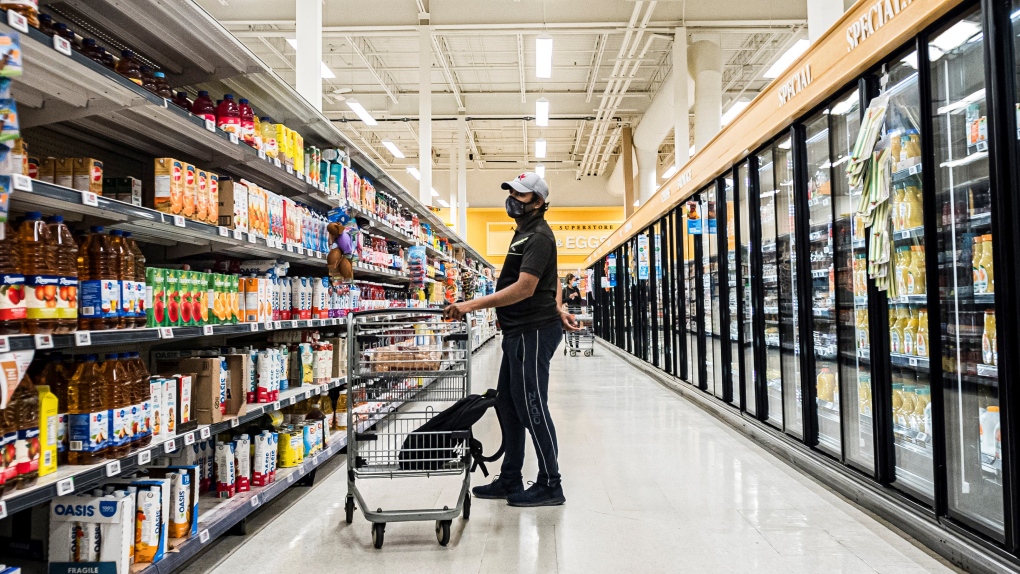December 28, 2021
-CTV
A majority of Canadians say they are going to change their food buying habits as prices are projected to rise in 2022 amid the ongoing COVID-19 pandemic.
That’s according to a new report released by the Agri-Food Analytics Lab at Dalhousie University, in partnership with Caddle.
The survey looked at Canadians’ concerns over rising food prices and how they intend to change their food buying and use habits in 2022 as a result.
A total of 9,999 Canadian adults took part in the survey, and were asked what they expect to see in 2022 when it comes to both prices at the grocery store, and at restaurants.
The survey comes on the heels of a report published earlier this month, which said overall, food prices are estimated to increase by five to seven per cent in 2022.
However, in this report, 60.2 per cent of respondents said they expect food prices will rise even higher than the projected seven per cent.
Sylvain Charlebois, Dalhousie University professor and the scientific director at Agri-Food Analytics Lab, told CTV’s Your Morning on Tuesday that Canadians are “showing up to the grocery store with a strategy.”
“They’re getting smarter when they actually shop around for food,” he said.
FOOD BUYING HABITS
The survey found 63 per cent of respondents said they intended to change their food buying habits in 2022.
The majority – 52.8 per cent – said they intend to use coupons more often.
The second most popular habit change, the report found, was eating out less, with 51.7 per cent of Canadians saying they intend to avoid restaurants in 2022.
A significant percentage of respondents (45.5 per cent), said they plan to consult flyers more often before shopping for food.
Some Canadians (30.3 per cent) said they will buy in bulk more in 2022, while 26.8 per cent said they will buy discounted food about to expire.
Charlebois said grocers are also noticing the food buying habits of their customers and are “trying to empower consumers to become food rescuers.”
“Products that are about to expire, for example, instead of just storing them away, they actually are reducing prices in order to entice consumers to buy some of these products,” he said. “And you can save a lot.”
Overall, Charlebois said even if prices are increasing at the grocery store, “it doesn’t mean you have to spend more.”
“And I think a lot of consumers [are] starting to understand that,” he said.
FOOD PRICE CONCERNS
The 12th edition of Canada’s Food Price Report released earlier this month projected that in 2022, the average family of four will spend up to $14,767 on food.
It said dairy products are expected to cost between six and eight per cent more in 2022, with the price of baked goods expected to increase by five to seven per cent.
Vegetables are forecast to cost five to seven per cent more, with fruits expected to cost three to five per cent more.
The report projects meat and seafood will cost up to two per cent more.
It will also cost more to eat out, the report said, with prices at restaurants expected to increase by six to eight per cent in 2022.
The new survey found 49.3 per cent of Canadians are concerned about the price of meat, while only 22.8 per cent said they are concerned about vegetable prices.
Just 12.8 per cent said they are concerned about fruit prices, and 6.4 per cent of respondents said they were concerned about dairy product pricing.
Canadians were the least concerned about fish, seafood and bakery product prices.
The overwhelming majority (89.8 per cent) of the survey’s respondents said they think food prices are increasing faster than their income.
A total of 65.4 per cent said food prices are increasing “much faster,” while 24.4 per cent said prices are increasing a “little faster” than their income.
DOING MORE WITH FOOD
Survey respondents were also asked what they intend to more in 2022.
The top response was to focus on reducing food waste, with 53.3 per cent of those surveyed.
Charlebois said reducing food waste is the “number one thing people have in mind right now.”
“If they can reduce the food they waste at home, they will be able to save money,” he said. “They know that, they just need to understand what’s in their fridge [and] what’s in their cupboards before they show up at the grocery store and not buy too much.”
More than 30 per cent of the survey’s respondents also said they would eat more fruits and vegetables, while 28.5 said they were planning to cook more.
Just over a fifth (20.2 per cent) of respondents said they intend to eat healthier in 2022.
METHODOLOGY: A total of 9,999 Canadians participated in the survey. The representative survey of Canadians was conducted in November 2021, in partnership with Caddle. The margin of error for this survey is +/- 1.3 per cent, 19 times out of 20. Any discrepancies in or between totals are due to rounding.




